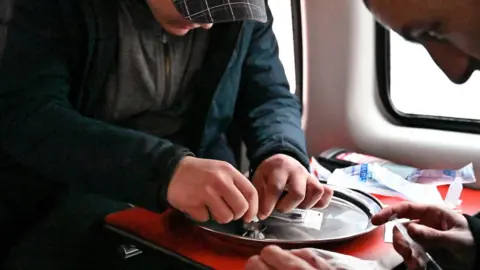Could drug consumption rooms become legal in Scotland?
 Getty Images
Getty ImagesA new effort to establish drug consumption rooms in Scotland against the wishes of the Home Office has been launched.
Campaigners say the facilities - where people can inject drugs under supervision - are needed to tackle record drug deaths in Scotland.
The Scottish government - which controls justice and health - supports their introduction, but a previous attempt to set up consumption rooms in Glasgow was blocked by UK government, which controls drug policy.
Why has the issue arisen again in Scotland?
Labour MSP Paul Sweeney has announced a consultation on a proposed Drug Death Prevention Bill, which would see the Scottish Parliament vote on introducing overdose prevention centres (OPCs) - also known as consumption or "fix" rooms.
Since 2015, Scotland has seen year-on-year record numbers of fatal overdoses and has among the worst drug death rates in Europe.
The crisis prompted more than £250m of investment by the Scottish government into the country's disjointed addiction services in 2021.
But campaigners and some politicians have called for more radical action, including the introduction of OPCs - which have been operating in a number of countries in Europe and North America for years.
Recognised as only part of the puzzle in solving Scotland's drug crisis, the proposals became symbolic of a public health approach campaigners said was needed.
Yet health officials in Glasgow had already tried to establish consumption rooms in Glasgow in 2016.
The city had faced the UK's worst outbreak of HIV in 30 years, as the virus spread among people injecting drugs in the city centre.

However, the proposals hit legal difficulties due to the need for police to ignore users carrying illegal drugs to the site.
The then-Lord Advocate James Wolffe QC - Scotland's top prosecutor - declined to back the plan in 2017, saying the issue was a public health matter rather than a justice one.
Subsequently, the UK government rejected the idea and currently has no plans to revisit the issue.
Glasgow MSP Paul Sweeney thinks that events have moved on enough for OPCs to now have a legal backing - despite opposition from Westminster.
So what has changed since the original proposals?
Crucially, Dorothy Bain QC became the new Lord Advocate in 2021.
In November last year, she told Holyrood's Justice Committee that she would listen to "a very well set out proposal" for OPCs.
She said: "Then in terms of the undoubted crisis that we face in relation to the number of drugs deaths in Scotland, if it is in the public interest that there should be no prosecutions for those using drug consumption facilities with all these safeguards that require to be in place, then that would require a fresh consideration by me as Lord Advocate."
It came one month after the Lord Advocate told MSPs that people caught with Class A drugs such as heroin could be given a warning instead of facing prosecution.
Scottish Conservatives said the move was "de facto decriminalisation".
Meanwhile, activist Peter Krykant set up his own so-called "safe consumption van" in Glasgow without official funding or permission from authorities in September 2020.

He was helped by Mr Sweeney, who said: "We were warned that we were breaking the law, but not one volunteer was ever charged under the Misuse of Drugs Act.
"I am confident that overdose prevention centres can be established legally, and the diversion from prosecution policy introduced by the Lord Advocate means that the police have discretion not to arrest people who use drugs for being in possession of drugs."
According to studies, consumption rooms can reduce overdose deaths, public injecting and drug-related litter, while a range of bodies and health experts - including the Royal College of Physicians of Edinburgh - say the proposals should be considered.
However, speaking to MSPs this year, UK policing minister Kit Malthouse described the evidence as "limited".
Experts from Glasgow Caledonian University, Queen's University Belfast and the University of Kent have since studied the use of Mr Krykant's injecting van.
In the nine months in operated, nearly 900 injections were supervised, while they recorded nine successful interventions in overdose events.
The study concluded: "It is feasible for an overdose prevention service to operate successfully in the UK without being shut down by the police or with negative consequences for the community."
Is it likely the Bill will pass?
Paul Sweeney first has to go through the consultation process before submitting a draft Bill at the Scottish Parliament.
However, OPCs have already been given support by the SNP, Scottish Labour, the Liberal Democrats and the Scottish Greens. The Scottish Conservatives have said they wouldn't block proposals for a pilot scheme.
Angela Constance MSP, the Scottish government's drug policy minister, said "there is clearly a will to act" at Holyrood.
She continued that the Scottish government is working with police, health authorities and the Crown Office "to examine how a safer drug consumption facility could operate within the existing legal framework, focusing on how any such facility could operate and be policed".
She added: "Work on the proposal is now at an advanced stage before it is submitted to the Lord Advocate."
But the UK government remains opposed to OPCs.
A Home Office spokesman said: "We have no plans to introduce drug consumption rooms in the UK.
"A range of crimes would be committed in the course of running such facilities, by both service users and staff, such as possession of a controlled drug or knowingly permitting the supply of a controlled drug on a premises."
